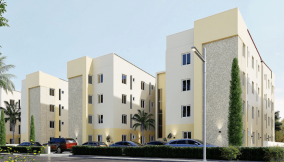Globally, the prime office market is struggling from the impact of economic headwinds which has slowed activity in the market, leading to 5 percent decline in leasing in the third quarter of 2022.
A new report, ‘Global Real Estate Perspective November 2022’ compiled by Jones Lang LaSale (JLL) notes that the economic headwinds is filtering through to heightened uncertainty and weighing on sentiment.
The fall out of this, according to the report, is that occupiers are now starting to have a more cautious approach with lengthening decision-making processes.
The report notes that a slowing momentum is becoming evident in the office market, adding that global office leasing declined by 5 percent in Q3 2022 from the previous quarter, although activity remains above Q3 2021. Net absorption was positive in the previous year but 31 percent lower over this year.
In Nigeria, market activities are also slow with fresh demand or take-up levels at 40 percent. There are lots of enquiries but conversion rates have been low. However, landlords have done well to retain existing tenants, offering concessions and rebates.
David Mbah, Managing Partner at MDS Properties Limited, told BusinessDay that much of the market demand has been for sizes below 200 square metres and for prices between N60,000 and N100,000 per square metre per annum, with most of the leased spaces in the Grade C office category.
Read also: Land banking, the death of real estate in Nigeria
“Grade A and B offices have retained effective rent at $350 – $600 per square metre while asking prices are $500 – $800 per square metre. Some of the landlords in the Grade A and B office category are willing to accept the naira equivalents of the rent at the official/CBN exchange rate,” Mbah revealed.
The JLL report notes further that the leasing markets remained resilient in the aftermath of Covid-19 up to the third quarter of 2021 with activity volume rising to 10 percent, but the story changed by the third quarter of 2022.
Carol Hodgson, Global Research Director, Property sectors at JLL, says however that, in most markets, high-quality, premium assets are significantly outperforming the rest of the market as occupiers look to upgrade space.
Hodgson notes that the global vacancy rate edged up 20 basis points to 14.5 percent in Q3, with the largest jump recorded in Asia Pacific followed by the US while it kept stable in Europe.
“Development completions have been elevated through 2022 and are expected to peak next year, boosted by an increase in new supply in Asia Pacific. Concerns around future demand levels combined with higher construction and financing costs are likely to mean that breaking ground on new developments will slow considerably across most locations,” she said.
This is also the Nigeria story as, according to Mbah, supply has waned and there are very few projects in the pipeline in places such as Victoria Island. He added that Ikoyi, on the other hand, is seeing an uptick in supply with Famfa Tower just completed and introducing about 22,000sqm into the market.
“Some of the few projects in the pipeline are BUA Tower and Dangote Tower, both on Kingsway Road, with about 7,000 and 17,000 sqm of office spaces respectively expected to be completed in 2023,” he said.
It is expected that refurbishments are to prevail in the coming tear as they are seen as a cheaper, quicker and more sustainable option.
The JLL report says there are warning signs that leasing in 2023 will be more subdued as some economies move into recession, noting that new requirements are starting to trend down or become contractionary.
“Our view is relatively conservative as we move into 2023. However, the flight-to-quality is expected to help support demand for prime and Grade A assets even in a more cautionary economic environment,” Hodgson said.
Going into the future, she sees ongoing flight-to-quality trend creating further bifurcation in the market, with demand for high-quality Grade A space showing greater resilience.
“Grade B and lower assets will come under increasing pressure and, in some cases, may be unleasable in their current form. A push towards refurbishments and retrofitting is needed across most global markets,” she said.
Join BusinessDay whatsapp Channel, to stay up to date
Open In Whatsapp





